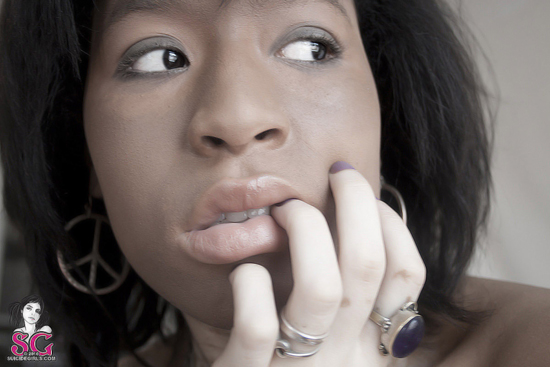
by Suri Suicide
This is the first in a series of ‘Art of SuicideGirls’ posts, which will highlight the creativity of our community members. If you’d like your work to be considered for inclusion, please reach out to Suri Suicide, who is curating the column.

[Kate Suicide in Hangover]
Artist / SG Member Name: Kate Suicide
Mission: “I was born in Chessington – the World of Adventures – a mere stones throw from the Vampire ride, which may explain, but not excuse, my slight leaning towards the dark and the macabre. Being a strange-looking goth at school hindered my popularity, but greatly helped my creativity, as I spent many hours alone in my room, drawing, painting and listening to strange, dark music.
[..]

By Edward Kelly
On paper, it seems like a no-brainer. Comedy and rap should, in theory, go together like Shakespeare and the stage – or CBS and derivative police procedurals. Even on a surface level, the similarities between comedy and hip-hop are many. Both are, essentially, spoken word art forms that are performed, at least in the beginning, at open mic nights in front of sometimes-hostile crowds. Both are very much raw and individual acts – an oftentimes undiluted, nerve-wracking display of what happens when a fan stops simply appreciating and starts producing material. As such, they invite a very personal dissection of an artist’s skill and talent.
But in practice comedy and rap rarely combine successfully. Sure, performers like MC Frontalot or MC Chris or Baddd Spellah are rappers and comedians, but part of their success is attributable to the postmodern, wink-wink comedic juxtaposition of gangsta rap clichés mixed with nerd culture quips. And while I love the nerdcore rappers, I can’t help but feel like I’m held at arms length. There’s an artifice there that can’t be bridged because, they’re essentially playing characters.
Rappers (and really all musicians) are at their best when the music feels, for lack of a less overused word, “real.” When Ice Cube told us that it was a good day because he didn’t have to use his AK, there was a certain sense of truth – a frustrated, angry condemnation of a society that allows injustice to continue. Likewise, transcendent comedy occurs when the comedian isn’t afraid to be uncomfortably honest about his life, such as when Louis CK rants about his young daughters’ bratty attitudes. The difference, of course, is that Cube uses testosterone-fueled posturing, while CK opts for exaggerated self-deprecation. Does that mean that CK doesn’t care about the injustice he sees in the world or that Cube isn’t aware of the inherently absurd nature of childrearing?
I don’t know the answer. But I have the feeling that Donald Glover does.
[..]

by Nicole Powers
The Pleasure Principle is an album that’s provided its maker, Gary Numan, with both instant and delayed gratification. Three decades ago, when the now classic electro album first came out, it made a massive impact culturally and commercially. The Pleasure Principle, and the iconic single it spawned, “Cars”, hit the number one spot simultaneously on the album and singles charts in the UK in September, 1979. The following year, the records crashed the US Billboard charts, making the painfully shy young vocalist, composer and musician a household name here too.
Numan’s Kraftwerk-inspired tracks, which channeled the voice of the machine, had a raw energy and DIY aesthetic that served as the bridge between ’70s punk and the early dance and hip-hop scenes of the 1980s. Indeed the bare break beats from the opening segment of “Films” (the fourth track on The Pleasure Principle) became the sample of choice for a generation of producers, thanks in part to the song’s inclusion on Street Beat’s tastemaker compilation series Ultimate Breaks and Beats (which served as the primary DJ and studio sample resource pre-CD).
Ironically, as the spotlight faded on Numan, the sounds he created proliferated exponentially through the fabric of pop music culture. As a new generation of producers sampled samples, the origins of these staple breaks escaped many. However those in the know – such as Basement Jaxx, Armand Van Heldon, Afrika Bambaataa and Dr. Dre – openly covered, used, credited and paid homage to Numan’s body of work.
[..]

Auriga Suicide in Bedroom WIndow


- INTO: Slytherin, fruit, books, rain, taking pictures, reading, writing, train rides, bubble tea, Tarantino films, Scorsese films, writing screenplays, Sundance, IFC, and the Anjelika.
- NOT INTO: The usual things people aren’t into like cruelty and such.
- MAKES ME HAPPY: Learning Hebrew, bubble tea, falafel, iPod, SG, happy thoughts, Woody Allen films.
- HOBBIES: Watching Sarah Silverman.
- 5 THINGS I CAN’T LIVE WITHOUT: The New Yorker, MAC, iPhone, Vaio, bubble tea.
- VICES: Nail biting.
- I SPEND MOST OF MY FREE TIME: Writing, reading, eating, and singing.
Get to know Auriga better over at SuicideGirls.com!








